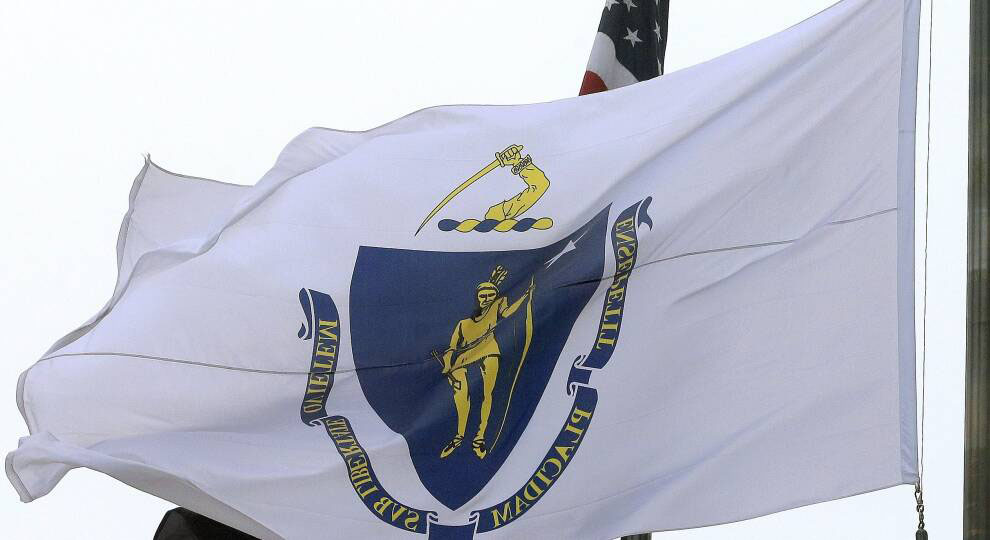Special commission backs new state seal and motto for Massachusetts
May 30, 2022

By Adam Reilly
May 17, 2022
The special commission charged with reevaluating Massachusetts’ state seal and motto voted unanimously Tuesday to recommend that both be completely replaced.
The current state seal, which dates back to 1898, depicts a Native American holding a bow and arrow and standing beneath an arm holding a sword — representing the colonial military leader Myles Standish — poised as if to strike. A motto in Latin unfurls around him, which is generally translated as: “By the sword we seek peace, but peace only under liberty.”
Advocates had pushed to change the seal for decades without success. Recently, though, the idea gained ground at the State House amid a nationwide reckoning with institutional racism, and a bill establishing the commission was passed by the Massachusetts House and Senate and signed into law by Governor Charlie Baker at the close of the 2020-2021 legislative session.
Prior to Tuesday’s vote, Brian Boyles, the commission’s co-chair and the executive director of Mass Humanities, cited a piece Edmund Garrett, the seal’s creator, wrote for New England Magazine in 1900 while arguing that the seal’s flaws go beyond a seeming threat of violence.
Related Stories
- Commission to review Mass. state seal and motto struggling to get the job done
- Does A Confederate Memorial Belong In Boston Harbor?
- How Christopher Columbus Came To Stand In Boston’s North End
“The face [of the Native American] was taken from a photograph plucked by the [Massachusetts] secretary of state at that time, William Olin, from the Bureau of Ethnology in Washington, D.C. of Thomas Little Shell, a Chippewa leader who never resided in Massachusetts,” Boyles said. “The figure is based on a skeleton [that was] held in the Peabody Museum at… Harvard University.
“No Native residents were consulted in this selection,” Boyles added. “It’s a reflection of centuries of intentional exclusion on the part of the Commonwealth — from land, laws, and historical records — of indigenous residents.”
Commissioner Melissa Ferretti, the chairwoman of the Herring Pond Wampanoag Tribe, links her desire for a new seal and motto to her own experiences growing up in Plymouth, the local epicenter of a Puritan-centric narrative of Massachusetts history.
“Every morning when I wake up, I look into the eyes of a child that was raised in a town — Plymouth — where we were invisible,” Ferretti said.
“It [was] extremely difficult… growing up to not even really understand who I was as a person [or] know much about my indigenous heritage, and to have to hide that.” Ferretti added. “And to each day take the bus to [the] Plymouth school system, and to drive by Myles Standish State Forest, full well knowing that he was not someone to praise.”
Before the final, unanimous vote, Cheryl Andrews-Maltais, the chairwoman of the Wampanoag Tribe of Gay Head (Aquinnah), said that while she preferred an entirely new seal and motto, she was also open to revamping them.
“My personal opinion is, I can live with certain elements, because I’m also a realist,” Andrews-Maltais said. “[I understand] that while we, the indigenous people, are the ones that have been harmed and impacted by the negative imagery, or the interpretation of that imagery… we are a subset of the members, or the citizens, of the Commonwealth of Massachusetts.”
Also before the vote, Brig. Gen. Leonid Kondratiuk, the historical-services director for the Massachusetts National Guard, urged his colleagues and the public to remember that the state flag, which is adorned by the current seal and motto, has a historical link to local military service.
“Seventeen thousand Massachusetts soldiers died under that flag from 1787 to World War I,” Kondratiuk said. “Of course, we all respect that. But as a retired military officer… that is on my mind as we approach Memorial Day.”
After backing the creation of a brand-new seal and motto, the commission’s members weighed whether to solicit input from the public first or to create new options and then offer them for public feedback.
While no vote was taken, there seemed to be a clear preference for going to the public at the outset of the process.
“Soliciting inputs is really helpful, because that then allows you to kind of sift through those and help distill,” said commissioner Micah Whitson, a branding expert with experience in flag redesign.
“We all know about design by committee — it doesn’t work out very well — but I think input and brief by committee is extremely important, because you can hear all the concerns and you can see where there are thematic elements that are… arising from the same places, and then get to some clarity,” Whitson said.
That approach could test the commission’s ability to move quickly, however.
In April, the commission voted to ask the Legislature for a new deadline of March 31, 2023 to finish its work rather than the existing December 31, 2022 deadline. It would be the third extension received by the commission, which had an original deadline of October 1, 2021.
The Legislature has yet to approve that request.
Produced with assistance from the Public Media Journalists Association Editor Corps funded by the Corporation for Public Broadcasting, a private corporation funded by the American people.